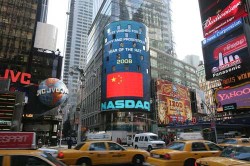A Special Chinese Share Trapdoor
Posted on September 20, 2012 Living in China often makes you want to buy a piece of the growth. Yahoo had some great returns, but then fell out with Alibaba. How did that happen? The answer is bound up with some of the special features of China. One such strategy is the use of variable interest entities or VIEs, which aren’t all they seem.
Living in China often makes you want to buy a piece of the growth. Yahoo had some great returns, but then fell out with Alibaba. How did that happen? The answer is bound up with some of the special features of China. One such strategy is the use of variable interest entities or VIEs, which aren’t all they seem.
What is a VIE?
A VIE business structure is a contractual arrangement between a Chinese owned entity and a wholly owned foreign enterprise (WOFE) in a relationship called a Variable Interest Entity (VIE). The WOFE provides the Chinese company with capital and in exchange receives control of the company and its earnings. Importantly, however, the WOFE does not receive a majority voting interest in the VIE.
Various restrictions are in place to prevent foreigners from investing in several key industries such as mining, steel, education, telecommunication and the internet. Despite this, many investors have found methods of getting around these restrictions by using VIEs. For overseas listings, these are very common.
This set up however is something of a grey area in Chinese law. There is no case law supporting the use of these vehicles to invest in China without breaking ownership restrictions. VIEs have been quite popular in recent years and approximately half of the Chinese companies listed on US exchanges derived at least a portion of their income from VIEs. So what are the risks?
Inherent Risks of VIEs
The WOFE’s control over the VIE is limited due to its lack of voting power. This can be problematic if opinions differ between the managers of the VIE and the WOFE.
Also, the enforceability of the contract underlying the arrangement can be uncertain especially if there are several holding companies across different jurisdictions, each with their own legal loopholes.
Why is this important? Because without an enforceable contract, the VIE is under no obligation to transfer its earnings to the WOFE. Getting worried yet?
External Risks of VIEs
The most substantial risk affecting VIEs stems from the Chinese government. VIEs contradict Chinese public policy and could theoretically be completely outlawed at any time. This would also render your investment worthless. The likelihood of this occurring is very unclear but it mustbe seriously considered.
 Will the Chinese Government Actually Outlaw VIEs?
Will the Chinese Government Actually Outlaw VIEs?
At this point in time, nobody has a definitive answer to this question. There are valid arguments running both ways.
Many large and prominent Chinese companies such as Baidu, Sina.com and Tudou use a VIE structure, a fact well known by the Chinese government. It is arguable that if the government really wanted to shut down these arrangements it would have done so already. The VIE model has worked well for China’s booming internet sector so why stop it now?
Despite the advantages of VIEs to the Chinese, recent events show that the government is growing uneasy.
- 2009: various Chinese ministries announce that VIEs are banned for companies involved in internet gaming.
- March 2011: an offering for Buddha Steel, via a VIE arrangement, is blocked by local authorities.
- May 2011: Alibaba, a VIE connected to Yahoo, transfers valuable assets into a privately owned company without Yahoos consent.
While Alibaba alleges that its actions were forced by authorities in Beijing, there are others who believe the company’s chairman transferred the assets simply because he could. He knew that if challenged in court, the VIE contract would be deemed void and he would suffer little to no consequences. How interesting and worrying!
Well it is the law, after all.
Also, the government has form with changing its mind when it suits it. Pointing out laws to enforce their point on a change of tack is a typical strategy. Failure to prosecute before has been no protection to rich Chinese billionaires who often only face scrutiny for missed tax filings only when they make the top 100 richest. Officials move and your key guanxi can sometimes go with it.
Furthermore VIE’s are a cornerstone of overseas listings, not Chinese listings. The Chinese government has a long term goal of building the domestic stock market and finance industry. Supporting VIE’s, despite their capital raising potential, doesn’t fit their long term industry development goals. It’s not a good idea to stand in between the Chinese government and their long term goals in our experience.
Future Investments in US Listed Chinese Companies
Investing in VIE reliant Chinese stocks is risky. To avoid this risk consider companies that don’t use this structure. Some can be found in the US, but many more in Hong Kong. Or consider a fund that is managed in the mainland and has a correlation with the Chinese mainland markets which typically don’t have VIE structured vehicles.
The bottom line for investors is the same. Know what you buy. Investing in a company that has a VIE structure is by no means a secure guarantee to a Chinese company’s earnings. Caveat Emptor.
About Caterer Goodman Partners
Caterer Goodman Partners is a Shanghai based wealth management firm established with a clear vision to provide a new level of personalized financial planning services for expatriates in Asia. Our financial advisors provide guidance for our clients in all areas of investment, specialising in managed accounts, money-market funds, retirement planning and alternative investments. At Caterer Goodman Partners, we offer our advice and experience to provide low cost, tax-effective and simple solutions to match our clients’ interests.
About Owen Caterer
Since graduation Mr Owen Caterer has worked with the Queensland Premier's Department in Trade Facilitation and then as a financial adviser in Shanghai from 2005 until 2010. He then rose to Senior Adviser, then Business Development manager and then to Chief Investment Officer responsible for portfolios to a value of US$280 million across Asia. Following that Mr Caterer left to found his own firm with a partner in the financial advisory and wealth management area. This focused on developing China and Asia's first fee-based financial advisory (rather than commission-based). This has grown to now have 8 staff and and managing almost US$35 million for clients throughout Asia. This business success was recognized as a finalist in the 2013 ACBA in the Start Up Enterprises category and are one of a small number of foreign managed firms to have a full asset management license in China. Owen has also been active in the community volunteering for the Australian Chamber of Commerce in Shanghai and acting as the Vice-Chair of the Small Business Working Group (2012-2014) and as the Co-Deputy Chair of the Financial Services since 2013 until the present. They have continued to grow their business and have now been selected as a small group of companies who are platinum members of the Australian chamber of commerce. The achievement they are most proud of is their efforts to reform the financial planning industry in China and push it away from a hard-sales commission driven model to a more ethical management fee and long term customer service model. Owen has a Graduate Diploma of Applied Finance from the Securities Institute of Australia of which he was a member as a Fellow of Finance for many years and also has an undergraduate degree from Griffith University in International Business. Owen's interests are tennis, running and his wife and two children. He speaks fluent Chinese, first arriving in China in 1997.
Tags: Caterer Goodman, Chinese, Expat, Investment, Owen, Owen Caterer, Shanghai, Share, Stock, trapdoor
Categorised in: Investing in China, Investments

